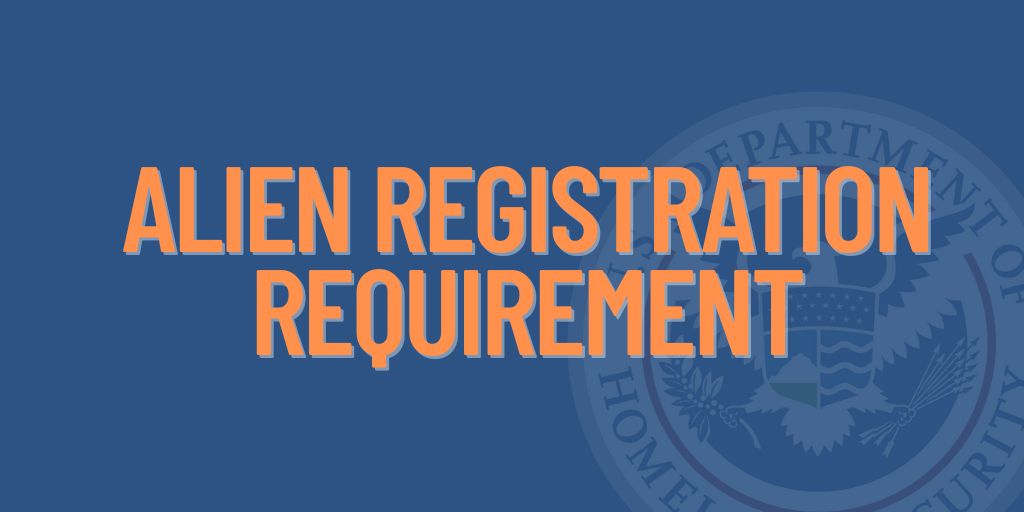Understanding the New Alien Registration Requirements: Who Must Register, Penalties for Non-Compliance, and Parental Responsibilities
On March 12, 2025, the Department of Homeland Security published an Interim Final Rule (IFR) titled “Alien Registration Form and Evidence of Registration.” Under the new rule, starting April 11, 2025, non-U.S. citizens staying in the U.S. for 30 days or more must register with the Department of Homeland Security (DHS) (if they have not already been “registered” as part of a visa application or U.S. entry) and carry proof of registration, with failure to do so resulting in potential penalties.
The vast majority of valid visa holders who are currently in the United States are likely deemed to be registered by virtue of their visa applications or U.S. entry processing. But there are exceptions, especially for parents or legal guardians of children under 14 and for Canada visitors who entered the U.S. via land port of entry.
Who Is Required to Register?
The new rule requires that, with limited exceptions, all noncitizens 14 years of age or older who were not previously “registered” and fingerprinted (if required) when applying for a U.S. visa or upon U.S. admission and who remain in the United States for 30 days or longer, must apply for registration and fingerprinting.
Similarly, parents and legal guardians of aliens below the age of 14 must ensure that those aliens are registered within 30 days of reaching their 14th birthday.
Who Is Already Registered?
Many noncitizens may already be registered and do not need to complete the new registration process. These include:
- Lawful Permanent Residents (LPRs): Green card holders are already registered as part of their permanent residency process, including those who have been issued an immigrant visa.
- Parolees: individuals paroled into the United States under INA 212(d)(5) even if the parole term has expired.
- Individuals admitted as nonimmigrants: Those who are admitted in the United States as nonimmigrants who were issued Form I-94 at the port of entry.
- Individuals with visas: Those who are present in the United States who were issued immigrant or nonimmigrant visas prior to arrival.
- EAD holders: individuals who have been issued an Employment Authorization Document.
- Removal proceedings: individuals who have been placed into removal proceedings.
- Certain applicants: individuals who have applied for lawful permanent residence using Forms I-485, I-687, I-691, I-698, I-700, and provided fingerprints (unless waived), even if the applications were denied.
- Border Crossing Cards: individuals with Border Crossing Cards.
Key Provisions of the Final Rule
- Mandatory Use of Form G-325R
- DHS designates Form G-325R, Biographic Information (Registration) as the official document for fulfilling alien registration obligations.
- The form must be completed and submitted online via an individual’s USCIS account.
- It requires noncitizens to provide their address history, immigration status, criminal history (if applicable), and employment details.
- Proof of Registration Requirement
- Upon successful registration, USCIS will issue a “USCIS Proof of G-325R Registration”.
- Noncitizens must carry this proof at all times and law enforcement may request to see proof of registration during lawful encounters.
- Biometric Data Collection
- USCIS may schedule a biometric appointment at an Application Support Center (ASC) for registrants who have not previously provided fingerprints or other biometric data
- Biometrics will be used to conduct background checks and verify identity, criminal history, and national security concerns.
- For more information see our article on What to Expect During Biometrics?
- Responsibilities of Parents of Children Turning 14
- Parents or legal guardians are responsible for ensuring that children who reach the age of 14 comply with registration requirements within 30 days of their birthday if they have not already registered.
- Failure to register a child within the required timeframe may result in penalties and could impact the child’s ability to obtain immigration benefits in the future.
- Parents should assist their children in completing Form G-325R and attending any biometric appointments scheduled by USCIS.
Penalties for Non-Compliance
Failure to register as required by law can result in serious consequences. Failure to register means a fine of up to $5,000 and up to six months in jail for a misdemeanor offense. If fraud or intentional evasion of immigration laws is involved, the penalties are more severe, with fines up to $10,000 and imprisonment for up to five years.
There are also civil and immigration consequences. DHS may impose fines of up to $2,000 for failing to register and repeated violations can lead to higher fines or removal proceedings. Finally, not registering could make one deportable under U.S. immigration laws or can also prevent from adjusting your status, applying for citizenship, or receiving certain immigration benefits.
Conclusion
Compliance with the new registration requirements is essential to maintaining legal status in the United States or to avoiding penalties. Parents must be especially mindful of their responsibilities when their children turn 14, ensuring timely registration to avoid penalties. Additionally, Canadian nationals entering through land borders should be aware of the 30-day rule.
Understanding and following these regulations will help noncitizens maintain their lawful status and avoid unnecessary legal complications. Please do not hesitate to contact us or book a phone consultation for advice. Also, please feel free to subscribe to our free weekly newsletter to obtain developments on this and related topics.
Related News and Articles
The Capitol Immigration Law Group has been serving the business community for over 15 years and is one of the most widely respected immigration law firms focused solely on U.S. employment-based immigration. Disclaimer: we make all efforts to provide timely and accurate information; however, the information in this article may become outdated or may not be applicable to a specific set of facts. It is not to be construed as legal advice.

